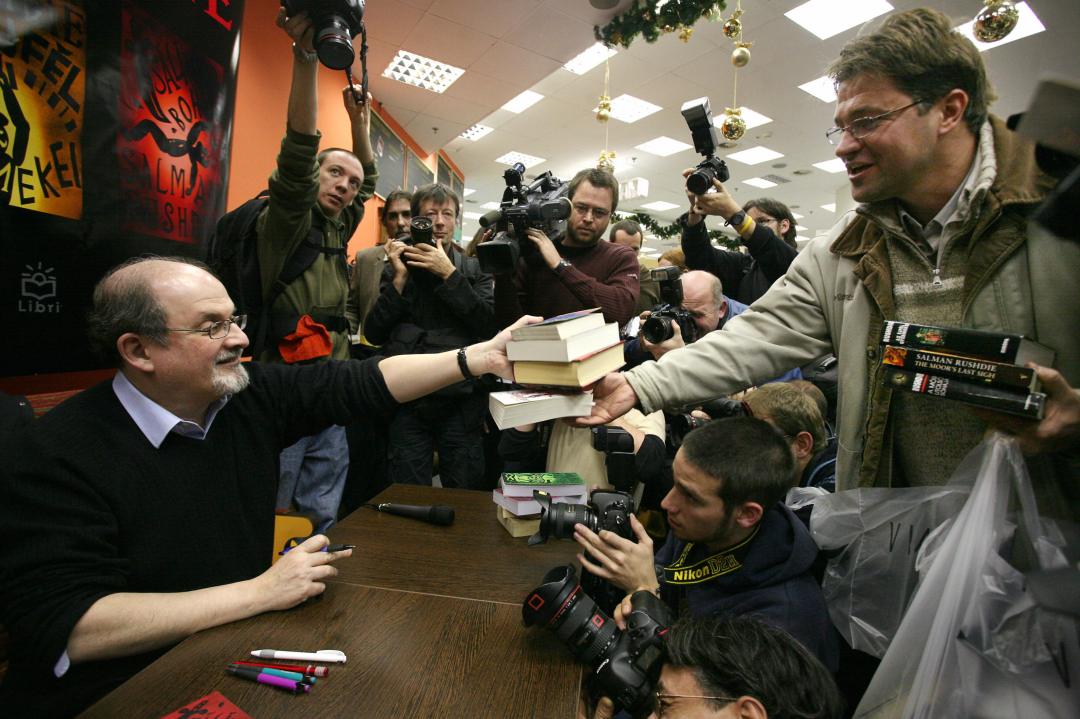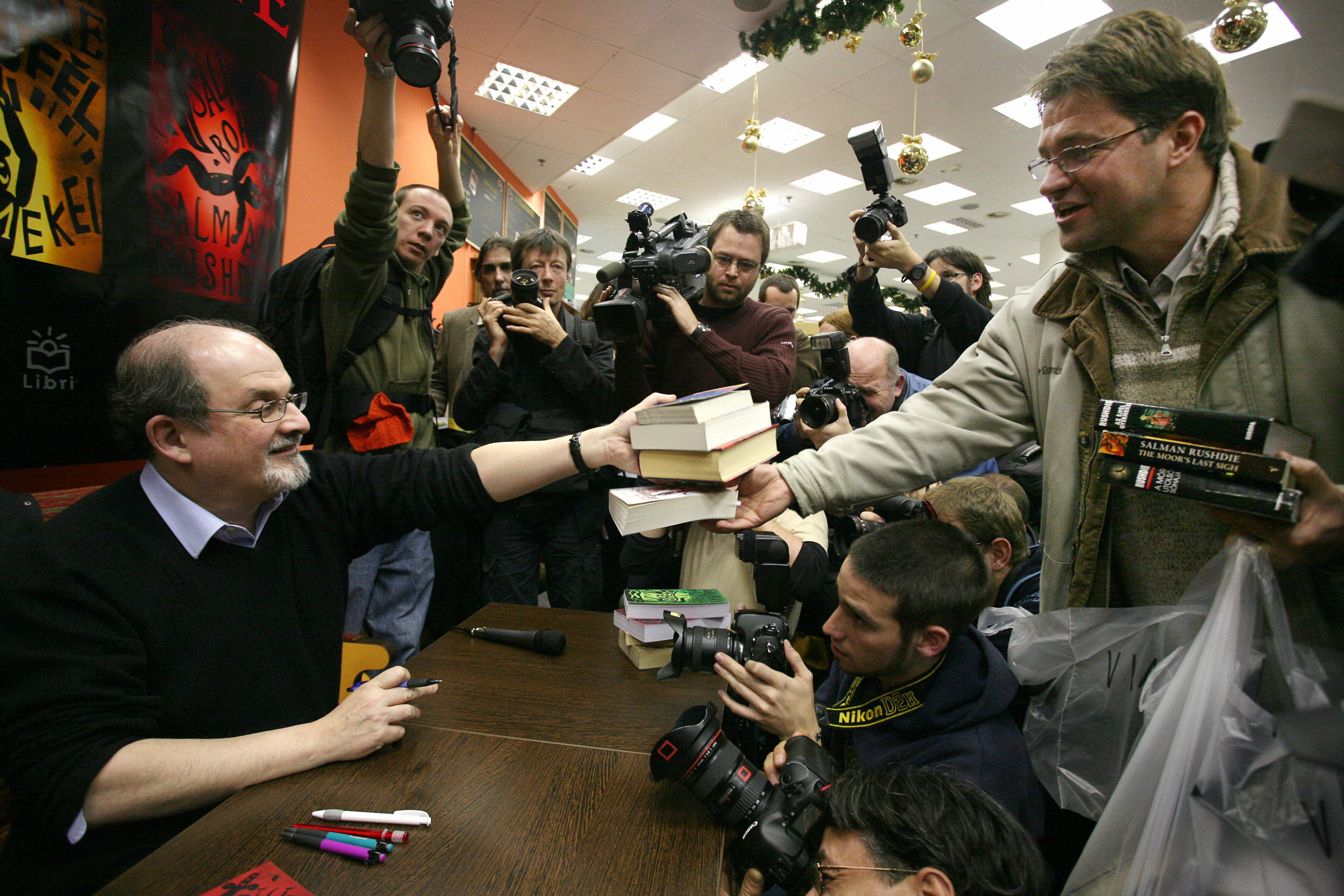It’s twenty years since I read The Satanic Verses. I didn’t much care for it back then, chiefly, as I recall, because Rushdie’s satirical and comic scenes left me untickled. But today – especially today – is a good moment to read the New Yorker’s excerpt from Rushdie’s forthcoming Fatwa Chronicle, Joseph Anton. If you can’t read it today, read it tomorrow. But do read it. Among other things, it made me want to go back and re-read The Satanic Verses.
There are many dates you could choose from which to start a chronicle of our times but, at least in terms of one big question, Valentine’s Day 1989 is as good as any and better than most places from which to begin. That was the day the Ayatollah issued his fatwa; the day life changed for Rushdie himself and, though we may not have perceived it thus at the time, for the rest of us too.
Sometimes we try too hard to make history fit into neat patterns and easily understood progressions. It doesn’t really happen like that. Nevertheless, looking back, 1989 still seems like a pause between the death of one world ending and the birth of another.
The Iran-Iraq war had ended, at last, in August 1988; Saddam would invade Kuwait in August 1990. In Tehran, Ayatollah Khomeini died. In South Africa, PW Botha was replaced by FW de Klerk. Closer to home, the Iron Curtain was lifted, the Warsaw Pact collapsed and the peoples of eastern europe were free – at last – to glimpse a once-only-imagined future.
So, in these and other ways, 1989 was a year in which the globe’s centre of political gravity shifted south and east from its post-war settlement to a new, less predictable, era. The old rules no longer applied. Besides, the game had changed.
The Rushdie Affair, as it became known, was a harbinger of all this. This warning from the future initially seemed almost ludicrous. A death sentence for publishing a novel? Book burnings in Bradford? Come off it! When Rushdie went into hiding – a phrase which, unfortunately, makes his predicament sound only marginally more serious than a children’s game of hide-and-seek – it did not take long for people who should have known better to ask just why the British state was spending funds protecting the novelist from the so-called “consequences” of his own actions. Besides, hadn’t Rushdie been kinda-somehow-sort-of asking for this? Didn’t he, whisper it, have it coming?
No he wasn’t and no he didn’t.
Perhaps it wasn’t sufficiently appreciated at the time but Rushdie was the victim of a terrorist campaign. Not just Rushdie either. Anyone associated with The Satanic Verses was a target too. That meant publishers, translators, even bookshops and libraries. All these were targeted and people were murdered.
Rushdie was a test. In the west, your claim to be a decent liberal in a decent liberal society was at stake. In the east, the stakes were very much higher. Those people who pusillanimously suggested Rushdie must carry some responsibility for violence for which he bore no responsibility at all betrayed would-be modernisers in the Arab world and those Imams and other muslim “community leaders” who had the courage to say Iranian politics should reach no further than the Straits of Hormuz. Some of those people were murdered too.
All this, however, was the beginning of a time in which taking offence would be elevated to an art form. Not all such faux-outraged, manipulated, foolishness would be as consequential or as violent as the Rushdie affair but, viewed retrospectively, I think you can see The Satanic Verses as the unhappy opening to The Age of Hurt Feelings.
To take a trivial contemporary example: the bluster and brouhaha and stupidity displayed in the reaction to the selling of t-shirts looking forward to the happy [sic] day of Margaret Thatcher’s death is the kind of manufactured outrage sadly typical of our politics. Apparently, at least according to some, Ed Miliband must apologise for or condemn (I’m not sure which but probably, actually, both) something for which he bears no responsibility whatsoever. His “failure” to do so is “shameful” you see.
Actually I don’t. This TUC t-shirt nano-tempest is an absurdity but the tediously predictable resort to claiming to be offended lies on the same spectrum as the, certainly vastly more serious, threats against Rushdie. It is part, albeit in miniature, of the same grievance-seeking culture. (The differences are significant and I don’t ignore them. Still…)
Mini-digression over. Back to Salman. It’s important to remember how many people failed the Rushdie Test. In Brother Cohen’s terrific book You Can’t Read This Book (though you can and should buy it) he digs out some reactions that are telling.
First, Norman Tebbit:
“How many societies having been so treated by a foreigner accepted in their midst, could go so far to protect him from the consequences of his egotistical and self-opinionated attack on the religion into which he was born”
Second, Margaret Thatcher:
“We have known in our own religion people doing things which are deeply offensive to some of us. We feel it very much. And that is what is happening to Islam”
Third, Geoffrey Howe:
“The British government, the British people have no affection for this book… It compares Britain with Hitler’s Germany… We do not like that any more than people of the Muslim faith like the attacks on their faith.”
None of these responses to the affair reflect well upon their owner. Each of them should be ashamed. You could, I suppose, say that Tebbit was praising the British state’s decency. But that would require you to ignore the fact he plainly believed Rushdie was fortunate to be afforded the privileges he had somehow, fortuitously been granted. After all, according to Tebbit, “Mr Salman Rushdie’s public life has been a record of despicable acts of betrayal to his upbringing, religion, adopted home and nationality.” If British Muslims (or any immigrant, of whatever faith or none) had cause to be offended, Tebbit’s implication that owning a British passport wasn’t enough to be properly British should have disturbed them more than anything Rushdie wrote.
Of course few people and certainly not Geoffrey Howe actually read Rushdie’s bloody book. (Had Howe done so he might have discovered that Britain is not compared to Nazi Germany in it. But even if it had been, so what?)
As for Mrs Thatcher, still then Prime Minister, she might have had a point had she made the connection between Protestant (or, more rarely but still real, Catholic) religious extremism in Britain’s own past now considered impossible and the hysterical reaction against Rushdie. But she did not. On this, the Iron Lady had all the backbone of a plush toy.
If conservatives were bad, the left was even worse. Remember, none of this is ancient history. When Rushdie was knighted five years ago – a gesture signalling there’s still some merit to the Honours system – Labour MPs lined up to express their “concerns”. Jack Straw, then serving as Home Secretary, went out of his way to “understand” the “sensitivities” in the [Muslim] “community”. He was answering a parliamentary question from the then Liberal [sic] Democrat MP Paul Rowen who complained:
“I am sure that like Rochdale, Mr Straw has had a number of complaints from Constituents who are furious at this award. I’ve got to say that I was surprised to see the honour bestowed on Mr Rushdie, especially when I felt that a number of respected authors who have made a real contribution to this country have been ignored.”
Even by the lofty standards of – excuse me – Liberal Democrat fuckwittery this is ghastly stuff. I rather wish Rushdie had been given his knighthood for services to liberty and decency rather than to literature but that’s far from saying his novels didn’t merit some public and symbolic recognition either.
The other awful thing about the Rushdie Affair is how easy it is to be on the good side of this dispute. Despite this many people still failed. And still do.
Rushdie, remember, made no deliberate attempt to antagonise Muslims. Indeed most of the criticisms of his novel are made by people who have neither read it nor have any interest in doing so. The offence – if there be any – is almost entirely manufactured.
We know by now that this doesn’t matter.
For those of us on the liberal side of this tussle there is every difference between Rushdie and people who really are Islamophobic bigots. But even they have rights too. That’s one of the benefits – and, if you like, costs – of living in a decent society.
When it comes to beliefs, Mencken’s famous line still seems right: “We must respect the other fellow’s religion, but only in the sense and to the extent that we respect his theory that his wife is beautiful and his children smart.”
That is, a measure of politeness is seemly but that politeness cannot be allowed to blind us to the truth or to the importance of our convictions. It is a sad business that all these years later the Rushdie Affair still has lessons that need learning.
Meanwhile, the courage and dignity Rushdie has displayed is, in its way, inspiring.








Comments